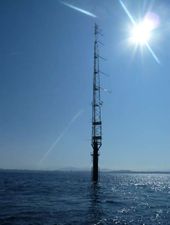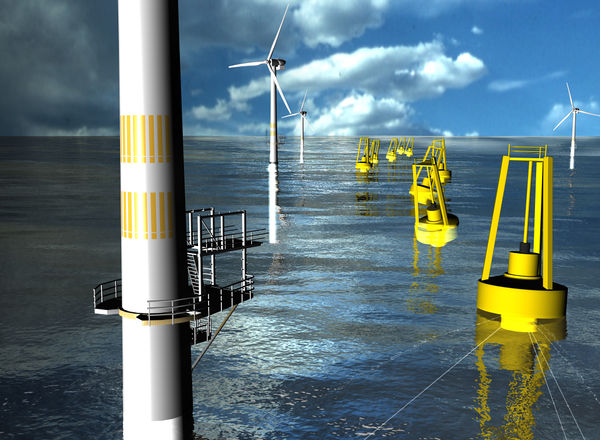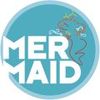Difference between revisions of "Portal:MERMAID/Atlantic Ocean"
Dronkers J (talk | contribs) |
|||
| (10 intermediate revisions by 3 users not shown) | |||
| Line 4: | Line 4: | ||
</div> | </div> | ||
| − | There are two test sites proposed for the project: Ubiarco and Santoña. Both test sites are located in Spain, off-shore the region of Cantabria. | + | ==Introduction Study Site== |
| + | |||
| + | There are two test sites proposed for the project: Ubiarco and Santoña. Both test sites are located in Spain, [[Offshore zone|off-shore]] the region of Cantabria. | ||
The Ubiarco test site is expected to be operational by the end of 2012. It will be able to manage three floating wind turbines and three wave energy concepts. They will be deployed reducing interaction and wake effects between them. Weather will be assessed thanks to a meteorological mast, which have been already deployed (June 2010) thanks to the R&D Company IDERMAR. | The Ubiarco test site is expected to be operational by the end of 2012. It will be able to manage three floating wind turbines and three wave energy concepts. They will be deployed reducing interaction and wake effects between them. Weather will be assessed thanks to a meteorological mast, which have been already deployed (June 2010) thanks to the R&D Company IDERMAR. | ||
| − | Santoña test site will be a small site devoted to wave energy devices and will also be connected to the grid. The electrical connection will be based on an onshore electrical substation, submerged power cables and a submerged pod all of them already available and ready for deployment. | + | Santoña test site will be a small site devoted to [[Wave energy converters|wave energy devices]] and will also be connected to the grid. The electrical connection will be based on an onshore electrical substation, submerged power cables and a submerged pod all of them already available and ready for deployment. |
Both sites will be fully monitored thanks to existing operational systems for wind, waves and currents. The floating platforms open up the opportunity of installing wind farms in deep waters because they do not need anchorage, something especially important in Spain, where the continental shelf is narrow. | Both sites will be fully monitored thanks to existing operational systems for wind, waves and currents. The floating platforms open up the opportunity of installing wind farms in deep waters because they do not need anchorage, something especially important in Spain, where the continental shelf is narrow. | ||
| − | Aquaculture experiences from other deep water sites will be used as a basis for analysing the potential at this site. The site is in particular challenged with very harsh wave conditions, which potential can be a large problem for aquaculture | + | [[Aquaculture]] experiences from other deep water sites will be used as a basis for analysing the potential at this site. The site is in particular challenged with very harsh wave conditions, which potential can be a large problem for aquaculture |
equipment. | equipment. | ||
| + | |||
| + | {|border="0,7" cellspacing="1" width="600px" align="center" | ||
| + | ! colspan=2 style="background:#008B8B"|<span style="color:white;"> '''<big>Atlantic Site Factsheet</big>'''</span> | ||
| + | |- | ||
| + | | style="background:#00CED1"|<span style="color:white;"> '''Geographical location''' </span> | ||
| + | | style="background:#00CED1"|<span style="color:white;"> '''Atlantic Ocean, north of Spain''' </span> | ||
| + | |- | ||
| + | |- | ||
| + | | style="background:#00CED1"|<span style="color:white;"> '''Surface area of study site''' </span> | ||
| + | | style="background:#00CED1"|<span style="color:white;"> '''100 km²''' </span> | ||
| + | |- | ||
| + | |- | ||
| + | | style="background:#00CED1"|<span style="color:white;"> '''Offshore distance''' </span> | ||
| + | | style="background:#00CED1"|<span style="color:white;"> '''3 - 20 km''' </span> | ||
| + | |- | ||
| + | |- | ||
| + | | style="background:#00CED1"|<span style="color:white;"> '''Depth''' </span> | ||
| + | | style="background:#00CED1"|<span style="color:white;"> '''50 - 250 m''' </span> | ||
| + | |- | ||
| + | |- | ||
| + | | style="background:#00CED1"|<span style="color:white;"> '''Substrate''' </span> | ||
| + | | style="background:#00CED1"|<span style="color:white;"> '''mix of sandy and rocky seabed''' </span> | ||
| + | |- | ||
| + | |- | ||
| + | | style="background:#00CED1"|<span style="color:white;"> '''Water temperature''' </span> | ||
| + | | style="background:#00CED1"|<span style="color:white;"> '''10 - 20°C''' </span> | ||
| + | |- | ||
| + | |- | ||
| + | | style="background:#00CED1"|<span style="color:white;"> '''Max. tidal currents''' </span> | ||
| + | | style="background:#00CED1"|<span style="color:white;"> '''1.5 cm/s''' </span> | ||
| + | |- | ||
| + | |- | ||
| + | | style="background:#00CED1"|<span style="color:white;"> '''Wave heights''' </span> | ||
| + | | style="background:#00CED1"|<span style="color:white;"> '''Mostly < 6 m''' </span> | ||
| + | |- | ||
| + | |- | ||
| + | | style="background:#00CED1"|<span style="color:white;"> '''Mean wave energy potential''' </span> | ||
| + | | style="background:#00CED1"|<span style="color:white;"> '''20 kW/m on 50 m depth''' </span> | ||
| + | |- | ||
| + | |- | ||
| + | | style="background:#00CED1"|<span style="color:white;"> '''Average wind speed''' </span> | ||
| + | | style="background:#00CED1"|<span style="color:white;"> '''7.5 m/s''' </span> | ||
| + | |- | ||
| + | |} | ||
| + | |||
| + | |||
| + | ==Combination User Functions & Design== | ||
| + | |||
| + | Based on the available resources and the characteristics of the Atlantic Site, a combination of offshore wind and wave energy extraction is opted for. The proposed scenario consists of an array of 5 MW wave energy converters and 2.5 MW wind turbines. Due to the water depth in the study site, only floating devices will be taken into consideration. Hence, the latter concept will be of particular interest for countries with a narrow continental shelf. The design of this multi-use offshore platform is especially challenging due to the very rough wave and wind conditions in the Atlantic Site. | ||
| + | |||
| + | [[File:Atlantic site.jpg|600px|thumbnail|center|An artist's impression of the multi-use platform which was conceptualized in the framework of the MERMAID project for the study site in the Atlantic Ocean.]] | ||
| + | |||
| + | |||
| + | ==Outlook & Challenges== | ||
| + | |||
| + | In the future, other user functions such as leisure and maritime transport may be integrated in the platform. Furthermore, the environmental impact of the converters, structures and foundations should be elucidated in more detail, and potential mitigation measures and eco-compatible design solutions should be identified. | ||
| + | |||
{{Mermaid}} | {{Mermaid}} | ||
| + | |||
| + | [[Category:North Atlantic]] | ||
Latest revision as of 10:20, 10 August 2019
Introduction Study Site
There are two test sites proposed for the project: Ubiarco and Santoña. Both test sites are located in Spain, off-shore the region of Cantabria.
The Ubiarco test site is expected to be operational by the end of 2012. It will be able to manage three floating wind turbines and three wave energy concepts. They will be deployed reducing interaction and wake effects between them. Weather will be assessed thanks to a meteorological mast, which have been already deployed (June 2010) thanks to the R&D Company IDERMAR.
Santoña test site will be a small site devoted to wave energy devices and will also be connected to the grid. The electrical connection will be based on an onshore electrical substation, submerged power cables and a submerged pod all of them already available and ready for deployment.
Both sites will be fully monitored thanks to existing operational systems for wind, waves and currents. The floating platforms open up the opportunity of installing wind farms in deep waters because they do not need anchorage, something especially important in Spain, where the continental shelf is narrow.
Aquaculture experiences from other deep water sites will be used as a basis for analysing the potential at this site. The site is in particular challenged with very harsh wave conditions, which potential can be a large problem for aquaculture equipment.
| Atlantic Site Factsheet | |
|---|---|
| Geographical location | Atlantic Ocean, north of Spain |
| Surface area of study site | 100 km² |
| Offshore distance | 3 - 20 km |
| Depth | 50 - 250 m |
| Substrate | mix of sandy and rocky seabed |
| Water temperature | 10 - 20°C |
| Max. tidal currents | 1.5 cm/s |
| Wave heights | Mostly < 6 m |
| Mean wave energy potential | 20 kW/m on 50 m depth |
| Average wind speed | 7.5 m/s |
Combination User Functions & Design
Based on the available resources and the characteristics of the Atlantic Site, a combination of offshore wind and wave energy extraction is opted for. The proposed scenario consists of an array of 5 MW wave energy converters and 2.5 MW wind turbines. Due to the water depth in the study site, only floating devices will be taken into consideration. Hence, the latter concept will be of particular interest for countries with a narrow continental shelf. The design of this multi-use offshore platform is especially challenging due to the very rough wave and wind conditions in the Atlantic Site.
Outlook & Challenges
In the future, other user functions such as leisure and maritime transport may be integrated in the platform. Furthermore, the environmental impact of the converters, structures and foundations should be elucidated in more detail, and potential mitigation measures and eco-compatible design solutions should be identified.


